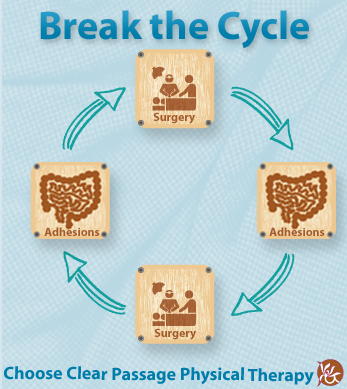
We received a question from one of our blog readers, and we thought it would be important to share the answer with all of our readers who may suffer or know someone who suffers from the pain and discomfort associated with bowel obstruction:
Can surgery for bowel obstructions cause adhesions? I know adhesions cause bowel obstructions, but can surgery for bowel obstructions cause adhesions?
In short, absolutely.
Surgical lysis of adhesions involves cutting or burning the adhesions under general anesthesia, via laparoscopy or laparotomy (open surgery). In addition, the bowel is generally severed, the obstructed area is removed, and the (now shortened) bowel ends are re-attached.
While lysis of bowel adhesions can be effective, surgery has some major drawbacks:
- Risks associated with general anesthesia and infection
- The body creates more bowel adhesions as it heals from the surgery designed to remove them (even with the skills of the finest surgeon)
- 90% of patients develop adhesions following open abdominal surgery
- 55% to 100% of women develop adhesions following pelvic surgery.1
- 35% of all open abdominal or pelvic surgery patients were readmitted to the hospital more than twice to treat post-surgical adhesions during the 10 years after their original surgery.2
Abdominal surgery itself has been implicated as a major cause of adhesion formation and many patients become trapped in a cycle of surgery-adhesions-surgery.
How can I break the surgical cycle?
Explore the non-surgical treatment options offered by Clear Passage Physical Therapy. Recognizing that surgery can cause abdominal adhesions to recur is an important step forward in our understanding of bowel obstruction. The benefits of choosing Clear Passage include:
- No drugs or surgery
- 20 years of experience treating bowel obstructions (SBO). Read more about the history of the Wurn Technique.
- Results reducing or eliminating obstructions
- Decrease in pain
- Returns mobility to organs that have become adhered.
- Liakakos T, Thomakos N, Fine PM, Dervenis C, Young RL. Peritoneal Adhesions: Etiology, Pathophysiology, and Clinical Significance.Dig Surg. 2001; 18: 260-273. PMID 11528133
- Ellis H, Moran BJ, Thompson JN, Parker MC, Wilson MS, Menzies D, McGuire A, Lower AM, Hawthorn RJ, O’Brien F, Buchan S, Crowe AM. Adhesion-related hospital readmissions after abdominal and pelvic surgery: a retrospective cohort study. Lancet Br J Med. 1999; 353: 1476-80. PMID 10232313.
Related Content:
- Adhesions and Scar Tissue
- Abdominal / Pelvic Adhesions
- Fascia and Fascial Adhesions
- What You Need to Know About Pelvic Adhesions
- Do Abdominal Adhesions Show on an MRI Scan?
- Patient Story: No Longer Shackled by Adhesions
- 3 Ways Adhesions Cause Bowel Obstructions
- How to Prevent Surgery Adhesions
- Adhesions in the Body: Presentation by Larry Wurn (Video)
- Break the Adhesion-Surgery Cycle
- Lifesaving Therapy for Intestinal Obstructions Comes to St. Louis
- Pelvic Adhesions: What You May Not Know
- What Are Adhesions? (Infographic)
- Adhesions: What You Can’t See Can Hurt You
- How Can Therapy Help Adhesions



